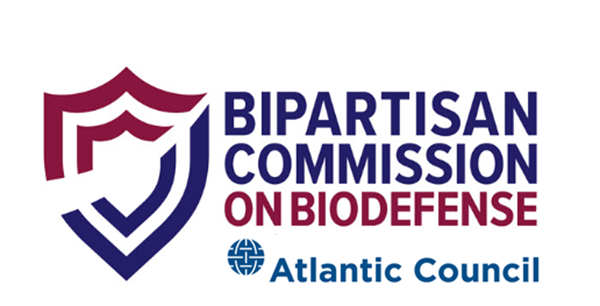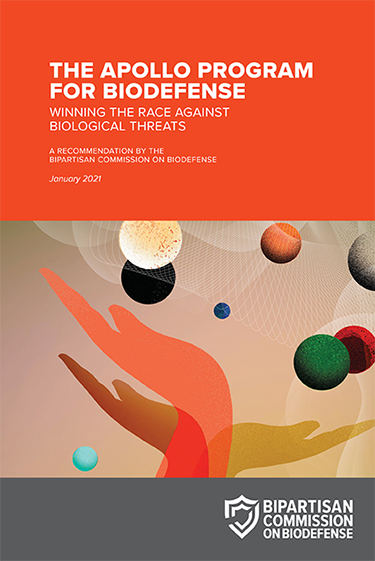On September 3rd, 2021, The Bipartisan Commission on Biodefense commended the Biden Administration for developing a new American Pandemic Preparedness Plan to invest boldly in a national effort that transforms U.S. capabilities to respond quickly and effectively to future biological threats. As detailed in The Apollo Program for Biodefense, doing so could effectively end the era of pandemic threats by 2030.
Table of Contents
- EXECUTIVE SUMMARY
- Recommendations
- Technology Priorities
- INTRODUCTION
- COVID-19: Yet Another Wake-Up Call
- The Future Landscape of Biological Threats
- The Path Forward: The Apollo Program for Biodefense
- Call to Action
- RECOMMENDATIONS
- CONCLUSION
- APPENDIX A: TECHNOLOGY PRIORITIES
- APPENDIX B: METHODOLOGY
- APPENDIX C: INTERVIEWED EXPERTS
- CITATIONS
Commissioners
Joseph I. Lieberman, Chair
Thomas J. Ridge, Chair
Thomas A. Daschle
James C. Greenwood
Kenneth L. Wainstein
Lisa O. Monaco
Ex Officio Members
Yonah Alexander, PhD
William B. Karesh, DVM
Rachel Levinson, MA
I. Lewis Libby, JD
Gerald W. Parker, DVM, PhD
George Poste, DVM, PhD, DSc
Tevi Troy, PhD
Commission Staff
Asha M. George, DrPH, Executive Director
John T. O’Brien, MS, Research Associate
Robert H. Bradley, Policy Associate
Patricia de la Sota, Operations Manager
Acknowledgments
We thank the experts, scientists, technologists, and policy experts who provided input to this report. We gratefully acknowledge Dr. Jacob Swett for his leadership and commitment to pushing the frontiers of science and technology, and Shelly Holland, Bill Beaver, Justin M. Chan, Dr. David J. Ecker, Dr. Michelle Holko, Dr. Anastasia Lambrou, Andrew Bo Liu, Dr. Cassidy Nelson, Dr. Jassi Pannu, Georgia Ray, and Dr. Brian Wang for their efforts to seek out the information and expertise we needed to inform our recommendations. We extend special thanks to Dr. Richard Danzig, Dr. Jason Matheny, and Dr. Tara O’Toole for their thoughtful advice. We are grateful for the guidance Dr. Tevi Troy, Dr. George Poste, and Rachel Levinson provided, as well as the review and comment provided by the Commission’s other ex officio members. Additionally, we thank our donors, and Hudson Institute, which serves as our fiscal sponsor.
Executive Summary
The COVID-19 pandemic is a stark wake-up call for the United States to take biological threats seriously. The virus is on track to take the lives of more than 400,000 Americans and cost our economy trillions of dollars. The risks of future pandemics increase as technological progress eases barriers to modifying pathogens, raising the specter of novel biological agents causing diseases much worse than humanity has ever faced. Meanwhile, U.S. vulnerabilities to biological attacks have never been clearer to our adversaries.
However, there is a path forward. The Apollo Program for Biodefense would provide the United States the opportunity to mobilize the nation and lead the world to meet these challenges: a world where we detect and continually trace any new pathogen from the source; where we can distribute rapid point-of-person tests to every household in the country within days of that detection; where effective treatments are already in-hand; where vaccine development and rollout occur in weeks rather than years; and where pandemics will never again threaten the lives and livelihoods of Americans and people around the world.
With clarity of purpose, this world is possible within the next decade. While ambitious, consider that in 1960, it was hard to imagine landing a person on the moon. Yet in 1961, President John F. Kennedy committed the United States to achieve that goal “before the decade is out.” Nine years later, with 161 days to spare, the United States accomplished the Apollo 11 mission and made human history. The United States can, and must, similarly put an end to pandemics before this decade is out.
The existential threat that the United States faces today from pandemics is one of the most pressing challenges of our time; and ending pandemics is more achievable today than landing on the moon was in 1961. Advances in the life sciences, accelerated by the pandemic, have brought technology to an inflection point where ending pandemics is within our grasp, but only if we commit ourselves.
Even the most ambitious program (about $10 billion annually) would be a small fraction of the current cost of the COVID-19 pandemic and an investment in our health, economy, and national security. Along with the needed structural, policy, and leadership changes detailed in the Commission’s 2015 National Blueprint for Biodefense, The Apollo Program for Biodefense would effectively end the era of pandemic threats by 2030.
Copyright © 2021 by the Bipartisan Commission on Biodefense. All rights reserved. www.biodefensecommission.org
Base cover art by Brian Stauffer.
Other graphics and design by Factor3 Digital
Bipartisan Commission on Biodefense. The Apollo Program for Biodefense: Winning the Race Against Biological Threats. Bipartisan Commission on Biodefense. Washington, DC: January 2021

